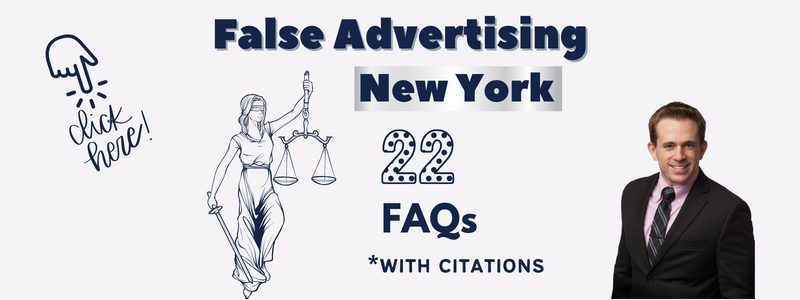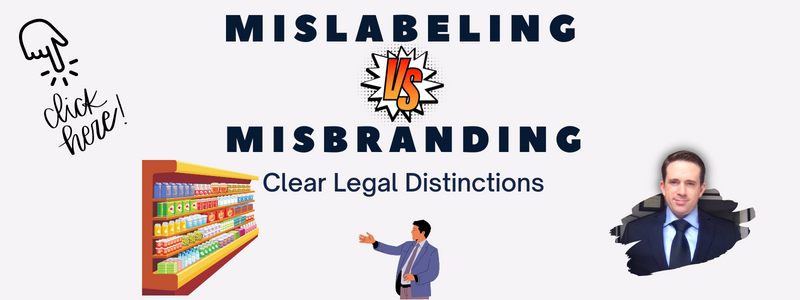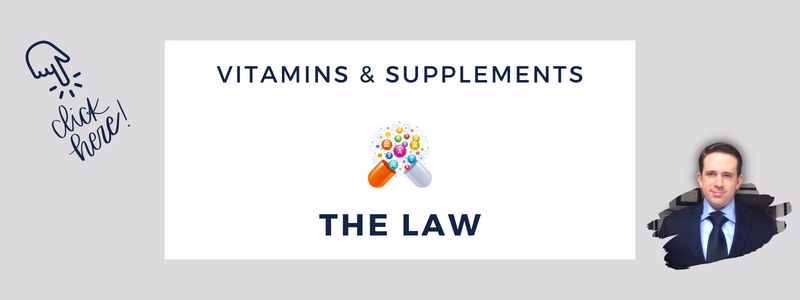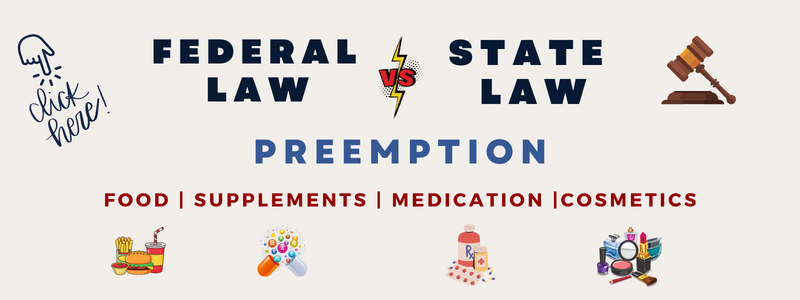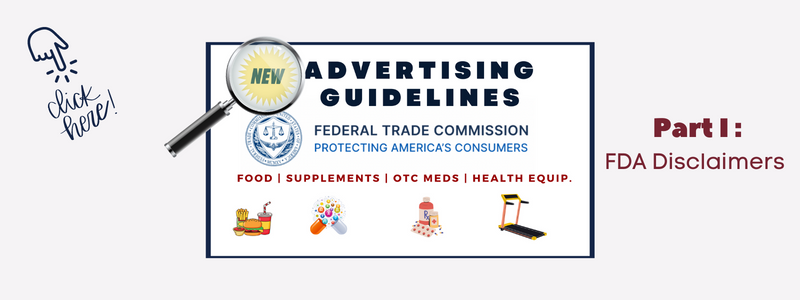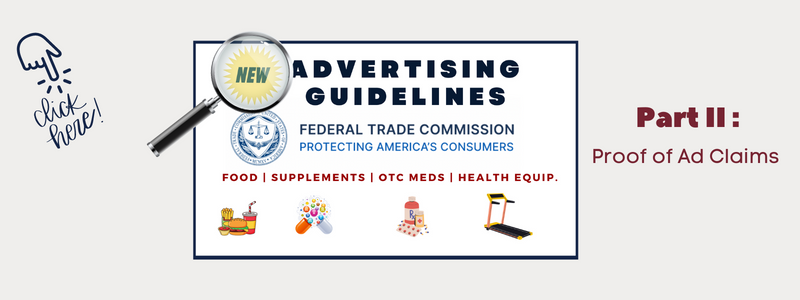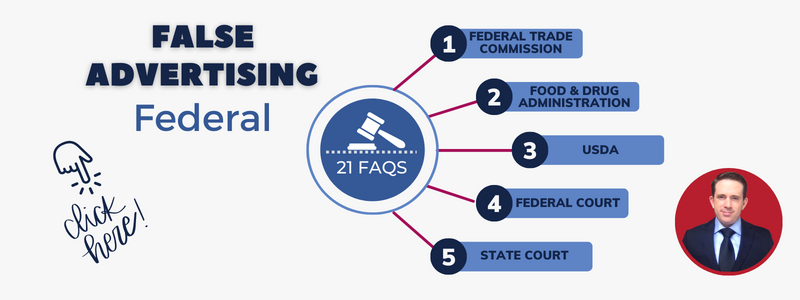Here are some key federal laws regulating food, beverages, dietary supplements, and cosmetics in the United States. Under each section are lists of the 10 most common products regulated under each law.
Federal Food, Drug, and Cosmetic Act (FDCA)
This law establishes the FDA's authority to oversee the safety of food, drugs, and cosmetics sold in the United States. It requires that food and drugs be safe for human consumption and that cosmetics not be adulterated or misbranded.
The FDCA regulates a wide range of products, but here are 10 of the most common products that fall under its purview:
- Food, including both human and animal food products
- Drugs, including prescription and over-the-counter medications
- Medical devices, including everything from tongue depressors to pacemakers
- Cosmetics, including makeup, skin creams, and hair products
- Electronic nicotine delivery systems (ENDS), including e-cigarettes and vape pens
- Dietary supplements, including vitamins, minerals, and herbal products
- Infant formula and baby food
- Food additives and colorings
- Animal drugs and feed
- Biologics, including vaccines, blood, and blood products, and gene therapies
Food Safety Modernization Act (FSMA)
This law, enacted in 2011, aims to improve food safety by shifting the focus from responding to foodborne illness outbreaks to preventing them from occurring in the first place. It requires food facilities to implement preventive controls to minimize contamination risk and develop food safety plans.
Here are 10 of the top products regulated by the FSMA:
- Fresh produce, including fruits and vegetables
- Dairy products, such as milk and cheese
- Seafood and shellfish, including raw oysters and other mollusks
- Eggs and egg products
- Ready-to-eat foods, including deli meats and salads
- Sprouts and sprout seeds
- Pet food and animal feed
- Processed foods, including canned goods and baked goods
- Grains and cereals, including rice and wheat
- Spices and seasonings
Nutrition Labeling and Education Act (NLEA)
This law requires most packaged food products to bear a nutrition label that provides information about the product's nutritional content, including the number of calories, fat, protein, and other nutrients.
Here are 10 of the top products regulated by the Nutrition Labeling and Education Act (NLEA), including dietary supplements:
- Breakfast cereals
- Bread and baked goods
- Snack foods, including chips, crackers, and popcorn
- Soups and broths
- Canned and bottled beverages, including soda, juice, and sports drinks
- Frozen foods, including entrees and vegetables
- Candy and sweets
- Dairy products, including milk, yogurt, and cheese
- Meat and poultry products, including ground beef and chicken
- Dietary supplements, including vitamins, minerals, herbals, and other botanicals
Dietary Supplement Health and Education Act (DSHEA)
This law defines dietary supplements as a separate food category and sets forth requirements for their labeling and advertising. It also allows specific health claims about supplements, subject to certain conditions.
Here are 10 of the top products regulated by the DSHEA:
- Vitamins, including vitamin C, vitamin D, and multivitamins
- Minerals, including calcium, iron, and magnesium
- Herbal supplements, including echinacea, ginseng, and St. John's Wort
- Probiotics and prebiotics
- Sports nutrition supplements, including protein powders and creatine
- Weight loss supplements, including green tea extract and garcinia cambogia
- Omega-3 supplements, including fish oil and krill oil
- Joint health supplements, including glucosamine and chondroitin
- Coenzyme Q10 (CoQ10)
- Fiber supplements, including psyllium and inulin
Fair Packaging and Labeling Act (FPLA)
This law requires that consumer commodities, including food, beverages, and cosmetics, be labeled with accurate and informative information about the contents and the identity of the product.
Here are 10 of the top products regulated by the FPLA:
- Food products, including packaged meats, snacks, and beverages
- Cosmetics, including makeup, skin care products, and hair products
- Household cleaning products, including laundry detergent and dish soap
- Personal care products, including soap and shampoo
- Over-the-counter drugs, including pain relievers and cough medicines
- Toys and games
- Clothing and textiles
- Appliances and electronics
- Pet food and animal feed
- Automotive products, including motor oil and antifreeze
Food Allergen Labeling and Consumer Protection Act (FALCPA)
This law requires that food labels identify any of the eight major food allergens (milk, eggs, fish, crustacean shellfish, tree nuts, peanuts, wheat, and soybeans) in the product.
Here are 10 of the top products regulated by the FALCPA:
- Milk and dairy products
- Eggs and egg products
- Fish and shellfish, including crab, lobster, and shrimp
- Wheat and wheat products, including bread and pasta
- Soybeans and soy products
- Peanuts and peanut products
- Tree nuts, including almonds, walnuts, and pecans
- Sesame seeds and sesame products
- Sulfites used as a preservative in many foods and beverages
- Mustard and mustard products
Federal Trade Commission Act (FTC Act)
This law gives the Federal Trade Commission (FTC) authority to regulate advertising and marketing practices for food, beverages, dietary supplements, and cosmetics. It prohibits deceptive or unfair advertising practices and gives the FTC the power to take action against companies that engage in such practices.
Here are 10 of the top products and services regulated by the FTC Act:
- Dietary supplements, including weight loss supplements and health-related claims
- Consumer electronics, including smartphones, laptops, and gaming consoles
- Automobiles and other motor vehicles, including safety claims and fuel efficiency claims
- Credit and loan services, including debt consolidation and credit repair
- Home appliances, including washing machines, refrigerators, and air conditioners
- Insurance products, including life insurance and health insurance
- Travel and hospitality services, including hotel bookings and vacation packages
- Online education and training programs, including claims about job placement and earning potential
- Cosmetics and personal care products, including claims about anti-aging and beauty benefits
- Food and beverage products, including health and nutrition claims and ingredient labeling
Food and Drug Administration Amendments Act (FDAAA)
This law established requirements for the registration and reporting of clinical trials for drugs, biologics, and medical devices and requires the registration of clinical trials for specific dietary supplements. It also requires the FDA to post information about clinical trials on its website.
Here are 10 of the top products regulated by the FDAAA:
- Prescription drugs and biologics, including new drugs seeking FDA approval
- Medical devices, including new devices seeking FDA approval
- Clinical trials for drugs, biologics, and medical devices, including registration and reporting requirements
- Pediatric drugs and devices, including incentives for conducting pediatric studies
- Postmarket studies and clinical trials, including requirements for conducting and reporting on these studies
- Risk evaluation and mitigation strategies (REMS), including requirements for developing and implementing these programs for certain drugs and biologics
- Direct-to-consumer advertising of prescription drugs, including requirements for submitting ads to the FDA for review
- Drug importation and reimportation, including requirements for ensuring the safety of imported drugs
- Pharmacy compounding, including new requirements for compounding pharmacies
- Biosimilars, including requirements for the FDA to develop and implement a regulatory pathway to approve biosimilars.
Public Health Service Act (PHSA)
This law authorizes the Department of Health and Human Services to regulate the safety of biological products, including vaccines and blood products. It also sets forth requirements for the safety and efficacy of medical devices.
Here are 10 of the top products regulated by the PHSA:
- Vaccines for infectious diseases, including measles, mumps, rubella, and hepatitis B
- Blood products, including whole blood, platelets, and plasma
- Biologics, including insulin and growth hormone
- Medical devices, including implantable devices, diagnostic equipment, and surgical instruments
- Gene therapies, including treatments for rare genetic disorders
- Antibiotics and antivirals, including treatments for tuberculosis and HIV
- Hormonal treatments, including estrogen replacement therapy and testosterone replacement therapy
- Cancer treatments, including chemotherapy drugs and radiation therapy devices
- Cardiovascular treatments, including pacemakers and stents
- Neurological treatments, including drugs for multiple sclerosis and Parkinson's disease
New York Law: Misbranding of food products
- New York Agriculture and Markets Law, Article 17—Adulteration, Packing, and Branding of Food and Food Products: This law regulates the labeling, advertising, and selling food products in New York. It prohibits the misbranding of food products and requires that all food products sold in New York be appropriately labeled with accurate and truthful information.
- New York General Business Law, Article 22-A—Consumer Protection from Deceptive Acts and Practices: This law regulates deceptive and misleading business practices, including false or misleading labeling of food products. It prohibits using false or misleading representations in labeling, advertising, or selling food products.
17 Reasons To Hire a False Advertising Lawyer
- Legal strategy: A lawyer can develop a legal strategy tailored to the unique circumstances of each case, increasing the chances of a successful outcome.
- Contingency fees: Many false advertising lawyers work on a contingency fee basis, meaning they only get paid if their client wins their case.
- Settlement negotiation: A false advertising lawyer can negotiate a fair and just settlement on their client's behalf.
- Legal expertise: False advertising cases can be complex, and it's essential to have a lawyer who understands the intricacies of this area of law.
- Objectivity: An experienced lawyer can provide objective advice and guidance, helping clients make informed decisions about their cases.
- Advocacy: A lawyer can advocate for consumers and represent their interests, helping to level the playing field in a legal dispute.
- Investigation: A lawyer can conduct investigations to uncover evidence of false advertising and build a strong case for their client.
- Protecting consumer rights: A lawyer can help consumers protect their rights and hold businesses accountable for deceptive advertising practices.
- Case management: A lawyer can help manage the many details of a legal dispute, including coordinating with other parties and ensuring that deadlines are met.
- Expert witnesses: A lawyer can consult expert witnesses to support their case and testify in court if necessary.
- Trial representation: If a case goes to trial, a lawyer can represent their client in court and present their case to a judge or jury.
- Compensatory damages: A lawyer can help consumers seek compensation for any damages they have suffered due to false advertising, such as financial losses, physical harm, or emotional distress.
- Preventing future harm: Pursuing a false advertising case can help prevent future harm by sending a message to businesses that they will be held accountable for deceptive practices.
- Access to resources: A lawyer can access resources and tools to help build a strong case, such as expert witnesses, investigators, and legal research databases.
- Negotiation skills: A lawyer can negotiate with the other party to reach a fair settlement without needing a costly and time-consuming trial.
- Statute of limitations: False advertising cases are subject to a statute of limitations, which means that consumers may only have a limited amount of time to pursue legal action. A lawyer can help ensure that consumers don't miss any important deadlines.
- Peace of mind: Hiring a false advertising lawyer can provide peace of mind, knowing that they have a legal professional on their side fighting for their rights and interests.
Related links:
- To get a free evaluation of your false-advertising case, complete this form.
- To understand whether federal law preempts state law on labeling of food, dietary supplements, or medications, click Does Federal Law "Preempt" (Block) State Lawsuits for Humane-Washing of Meat Labels?
- Learn more about Vitamins & Dietary Supplements
- For an expansive look into humane-washing, click Is Humane-Washing of Meat and Poultry False Advertising?
- Learn about the 4 purposes of advertising, along with numerous common myths in false adverting.
- For a comprehensive review of New York law, click The Ultimate Guide to False-Advertising Law in New York: 22 FAQs.
- Click here to learn more about humane-washing, green-washing, and nutri-washing.
- Were you Misled?: Complete that form for a free legal analysis to determine if you were deceived by humane-washing or green-washing.
A library of links relating to nutrition, animal welfare, and advertising law


.png)
